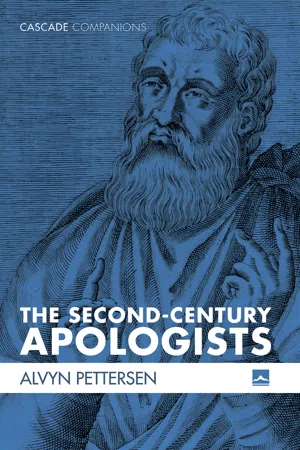
- 200 pages
- English
- ePUB (mobile friendly)
- Available on iOS & Android
The Second-Century Apologists
About this book
"They bring three charges against us: atheism, Thyestean banquets, and Oedipean unions." So a late second-century Christian Apologist wrote with reference to his critics. Against these and other charges the Apologists rallied. Not so, they maintained. It was not the Christians but their critics who were the atheists and the Christians were the true theists. They were atheists only insofar as they denied the fabricated gods of the cults and the immoral deities of theaters. That, they explained, was why Christians absented themselves, whatever the cost, from the imperial cult, theaters, and amphitheaters. They were not cannibals, as Thyestes was when he ate the flesh of his children. To suggest otherwise was to misunderstand Christians consuming Christ's flesh and blood at the Eucharist. Nor were they imitators of Oedipus, who entered into sexual relations with Jocasta, his Queen and, though he knew it not, also his mother. Christians did exchange the kiss of peace. They did love one another. They were not, however, incestuous. Any promiscuous love on their part extended only to a very practical love of every needy soul.This book explores these arguments, especially noting the Apologists' commitment to God's oneness, to Christians not worshipping anything made, and to humans properly caring for fellow creatures.
Tools to learn more effectively

Saving Books

Keyword Search

Annotating Text

Listen to it instead
Information
Christianity—Not New, and It Is True
Table of contents
- Title Page
- Acknowledgments
- Introduction
- The Second-Century Greco-Roman World
- Six Greek Christian Apologists
- Christianity—Not New, and It Is True
- Atheists? Guilty as Charged
- Atheists?—Not Guilty as Charged
- Thyestean Banquets and Oedipean Intercourse
- Postscript
- General History Outline
- Bibliography
Frequently asked questions
- Essential is ideal for learners and professionals who enjoy exploring a wide range of subjects. Access the Essential Library with 800,000+ trusted titles and best-sellers across business, personal growth, and the humanities. Includes unlimited reading time and Standard Read Aloud voice.
- Complete: Perfect for advanced learners and researchers needing full, unrestricted access. Unlock 1.4M+ books across hundreds of subjects, including academic and specialized titles. The Complete Plan also includes advanced features like Premium Read Aloud and Research Assistant.
Please note we cannot support devices running on iOS 13 and Android 7 or earlier. Learn more about using the app